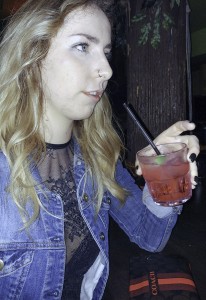Attitudes of women while clubbing

Emily Smith enjoys a drink to celebrate graduating from the University of Windsor nursing program. She said women judge each other on how they look and dress when out at clubs and expects that others will judge her for how she looks. (photo by David Lafreniere)
By David Lafreniere
An unscientific, online survey of 50 single women aged 19 to 29 asked them to anonymously answer questions about their attitudes about themselves while out clubbing. An additional 20 women were asked the same questions in person with their girlfriends around, while out on a pub crawl in Camden Town, an inner-city district of London in the U.K. It turns out that being around others may change how you answer.
Clinical Psychologist and researcher Josee Jarry said it is understandable as there is pressure to conform to some attitudes that society and the media have pushed on people. Jarry studies behavior that is not conducive to well-being among groups that do not have an identifiable disorder such as the attitude of people in linking physical weight to success. She is an expert on the psychology of appearance.
“My thesis is when people experience a threat to their self-esteem they may turn to appearance to compensate for problems in other parts of their life affecting self-esteem,” said Jarry. “However, the research shows that there is a difference between what people say and what they actually believe.”
For some people having grey hair does not matter, according to Jarry. For others, it is a significant event they want to change. Jarry wants to understand what goes on in a person’s life that may shape those differing attitudes.
The survey asked questions relating to confidence in body image, sexism and harassment, use of social media, well-being and sexual confidence.
Fifty-one per cent of the women surveyed online either strongly agreed or agreed they had confidence in their body image while clubbing. In person, the number of women who expressed confidence was 90 per cent. In the club environment 96 per cent of women said they did not judge other women on their appearance, while in the online anonymous survey, the number dropped to 30 per cent.
The results did not surprise Jarry who said her research at the University of Windsor was one of the first studies showing that people are secretive about how they feel about body image.
“Anti-fat attitudes have been driven underground in a culture where we are told not to judge and that we must accept everyone for who they are,” said Jarry. “When people are asked questions about body image they may declare very different things from what they actually believe.”
Both in person and online most women said they experience sexism and stereotyping while clubbing with 54 per cent of online respondents and 72 per cent of in person respondents reporting experiencing it. Most women also said they believed they had to adjust their behaviour to avoid sexual harassment.
Jarry said this may be because of a real threat or a perceived threat, but most people adapt their behavior based on experience.
Feeling free to express yourself, wear what you want and engage with new people through social media showed differences between women asked in person and online. All women interviewed in clubs said they wear what they want and are willing to meet new people and engage with them through social media. This dropped to 36 per cent for expressing yourself and 21 per cent for social media engagements by online respondents.
“The difference could be because women asked in clubs may have lower inhibitions from the club atmosphere and the effect of alcohol,” said Jarry.
In person 90 per cent said they believed they were emotionally well-adjusted and did not mind letting loose a little while clubbing. Online the results were 51 per cent agreeing or strongly agreeing and 29 per cent being neutral.
In person, with friends around them, almost all women said they would not leave a club with someone they met there. Women asked individually and online had more varied answers. Online some said not at all, others said it depended on the person they met and a few said it depended on how much they had to drink.


